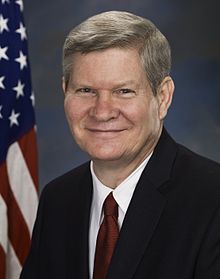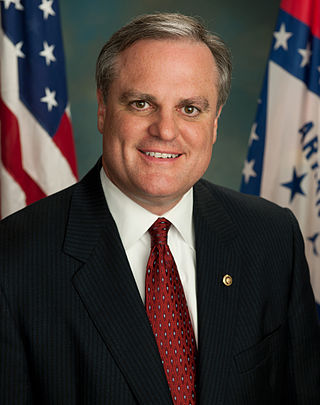
Mark Lunsford Pryor is an American attorney, politician and lobbyist who served as a United States Senator from Arkansas from 2003 to 2015. He previously served as Attorney General of Arkansas from 1999 to 2003 and in the Arkansas House of Representatives from 1991 to 1995. He is a member of the Democratic Party.
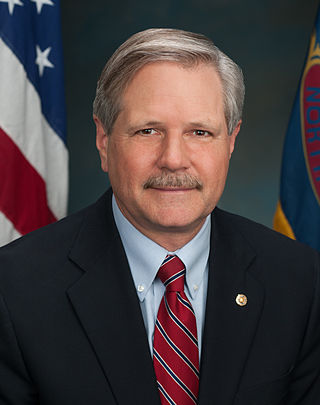
John Henry Hoeven III is an American banker and politician serving as the senior U.S. senator from North Dakota, a seat he has held since 2011. A member of the Republican Party, Hoeven served as the 31st governor of North Dakota from 2000 to 2010.

Thomas Richard Harkin is an American lawyer, author, and politician who served as a United States senator from Iowa from 1985 to 2015. A member of the Democratic Party, he previously was the U.S. representative for Iowa's 5th congressional district from 1975 to 1985. He is the longest-serving senator to spend the entire tenure as a state's junior senator.
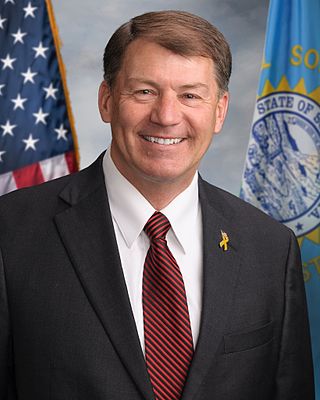
Marion Michael Rounds is an American businessman and politician serving as the junior United States senator from South Dakota since 2015. A member of the Republican Party, he served as the 31st governor of South Dakota from 2003 to 2011.

Byron Leslie Dorgan is an American author, businessman and former politician who served as a United States Representative (1981–1992) and United States Senator (1992–2011) from North Dakota. He is a member of the Democratic Party.

John Nichols Boozman is an American politician and former optometrist serving as the senior United States senator from Arkansas, a seat he has held since 2011. A member of the Republican Party, he was the U.S. representative for Arkansas's 3rd congressional district from 2001 to 2011. He is the dean of Arkansas's congressional delegation.

Stephanie Marie Herseth Sandlin is an American attorney, university administrator, and politician from the Democratic Party. She represented South Dakota's at-large congressional district in the United States House of Representatives from 2004 until 2011. Sandlin was first elected to Congress in a July 2004 and won three full terms before losing to Republican Kristi Noem in 2010. She was the youngest female member of the House, and the first woman elected to the House from South Dakota. Before her 2007 marriage to Max Sandlin, she was known as Stephanie Herseth. She is a Democrat and a member of the Herseth family of South Dakota. She and Senator Tim Johnson are the last Democrats to win a statewide and/or federal election in South Dakota.

Karl Earl Mundt was an American educator and a Republican member of the United States Congress, representing South Dakota in the United States House of Representatives (1939–1948) and in the United States Senate (1948–1973).
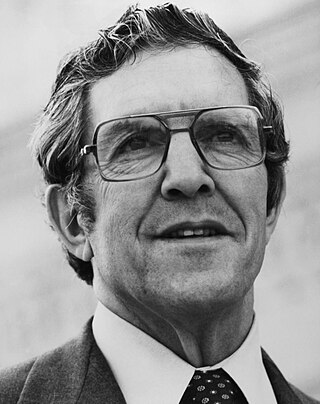
Ellis James Abdnor was an American politician who served as a member of the United States Senate from South Dakota. He was also the 15th Administrator of the Small Business Administration under presidents Ronald Reagan and George H. W. Bush.

John Randolph Thune is an American politician serving as the senior United States senator from South Dakota, a seat he has held since 2005. Thune is in his fourth Senate term and is the Senate minority whip, a post he has held since 2021. A member of the Republican Party, Thune served three terms as the U.S. representative for South Dakota's at-large congressional district from 1997 to 2003.

The 111th United States Congress was a meeting of the legislative branch of the United States federal government from January 3, 2009, until January 3, 2011. It began during the last weeks of the George W. Bush administration, with the remainder spanning the first two years of Barack Obama's presidency. It was composed of the Senate and the House of Representatives. The apportionment of seats in the House was based on the 2000 U.S. census.

The structure of the government of South Dakota is based on that of the federal government, with three branches of government: executive, legislative, and judicial. The structure of the state government is laid out in the Constitution of South Dakota, the highest law in the state. The constitution may be amended either by a majority vote of both houses of the legislature, or by voter initiative.

The 2002 United States Senate election in South Dakota was held on November 5, 2002. Incumbent Democratic U.S. Senator Tim Johnson narrowly won re-election to a second term over Republican John Thune by a margin of 524 votes, or 0.15%. This made the election the closest race of the 2002 Senate election cycle.

The 2004 United States Senate election in South Dakota was held on November 2, 2004. Incumbent Democratic U.S. Senator and Senate Minority Leader Tom Daschle ran for re-election to a fourth term, but was narrowly defeated by Republican John Thune.
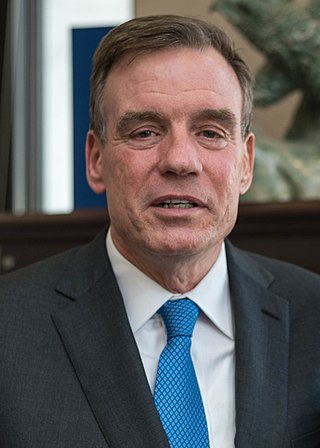
Mark Robert Warner is an American businessman and politician serving as the senior United States senator from Virginia, a seat he has held since 2009. A member of the Democratic Party, Warner served as the 69th governor of Virginia from 2002 to 2006. He is vice chair of the Senate Democratic Caucus and chair of the Senate Intelligence Committee.
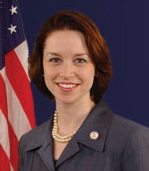
The 2002 United States House of Representatives election in South Dakota took place on Tuesday, November 5, 2002. Voters selected a representative for their single At-Large district, who ran on a statewide ballot.

Brendan Van Johnson is an American attorney who served as the 40th United States Attorney for the District of South Dakota. He is the son of former U.S. Senator Tim Johnson and currently is a partner at Robins Kaplan LLP, where he serves as the Chair of the Firm's National Business Litigation Group and Member of the Firm's Executive Board. In 2024, Johnson was recognized as one of America's Top 200 Lawyers for his litigation work and representation of Native American tribes.
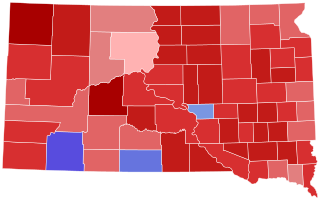
The 2022 United States Senate election in South Dakota was held on November 8, 2022, to elect a member of the United States Senate to represent the State of South Dakota. Incumbent three-term Republican U.S. Senator John Thune, who is the Senate Minority Whip, was first elected in 2004, defeating Democratic incumbent Tom Daschle, the then-Senate Minority Leader. He ran for reelection to a fourth term. The Democratic nominee was 26-year Navy, Air Force JAG Corps veteran, and former college professor Brian Bengs. Thune was ultimately reelected.

Dustin Michael Johnson is an American politician serving as the U.S. representative for South Dakota's at-large congressional district since 2019. A member of the Republican Party, he served as South Dakota Public Utilities Commissioner from 2005 to 2011, when he was appointed chief of staff to Governor Dennis Daugaard, a position he held until 2014. Between his state political career and congressional service, Johnson was the vice president of Vantage Point Solutions in Mitchell, South Dakota.

Kelly Michael Armstrong is an American lawyer and politician serving as the U.S. representative for North Dakota's at-large congressional district since 2019. A member of the Republican Party, he served as the North Dakota state senator from the 36th district from 2012 to 2018 and chair of the North Dakota Republican Party from 2015 until 2018. On January 23, 2024, he announced he would not seek re-election in 2024, instead opting to run in the 2024 North Dakota gubernatorial election.
